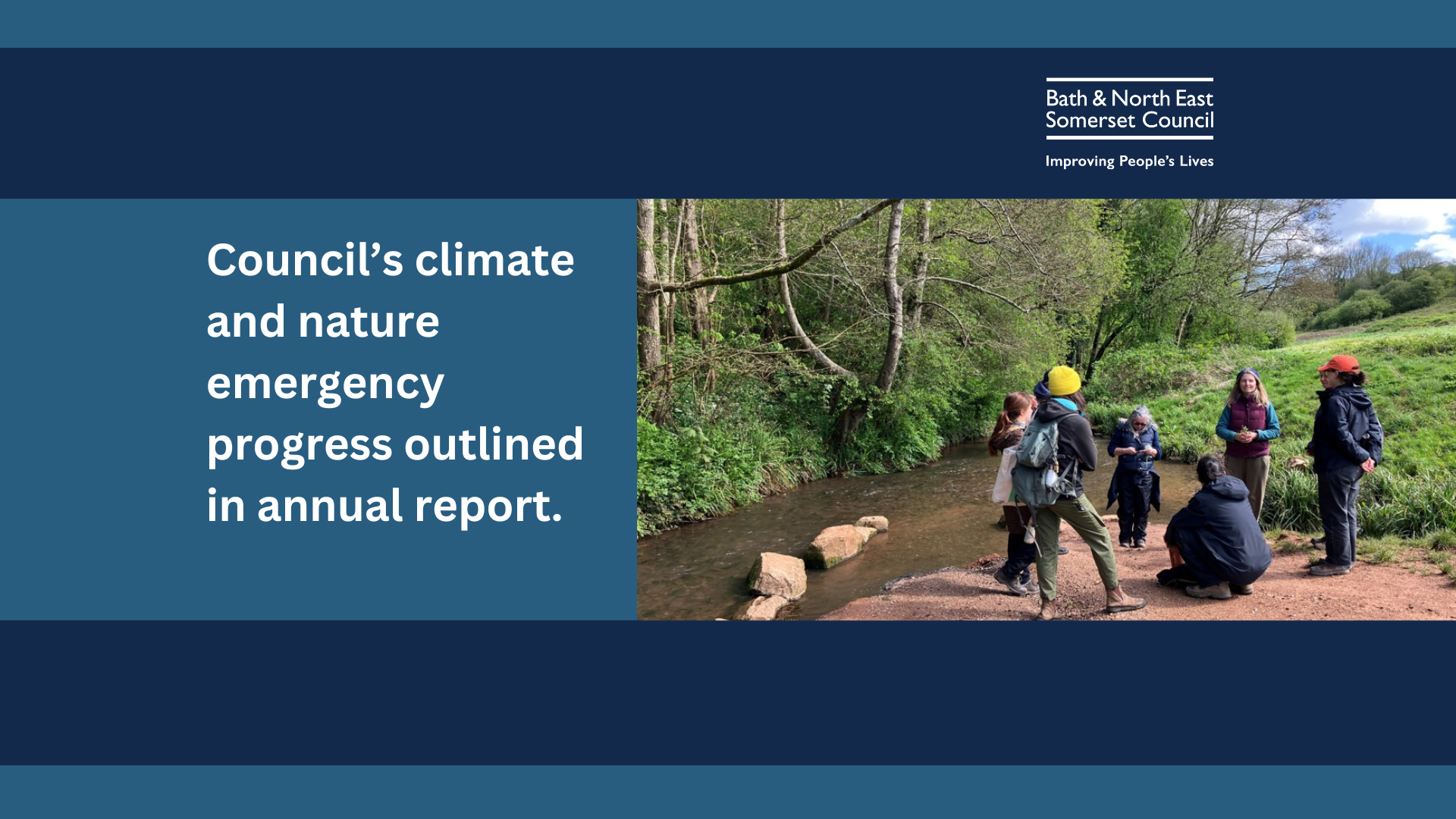Date published: 2024-09-05 | Category: Climate Emergency, Delivering for local residents, Ecological Emergency Action Plan, Preparing for the Future

Bath and North East Somerset has seen a 43 per cent reduction in emissions between 2005 and 2022 and a 36 per cent reduction in the council’s own emissions between 2016/17 and 2023/24 according to a new climate and nature emergency progress report.
The report, which highlights the progress Bath & North East Somerset Council has made on tackling the climate and ecological emergencies over the last financial year, will be presented to Cabinet on 12 September.
The annual report sets out the action that has been taken and identifies activity that is underway and planned to meet one of the council’s core priorities as set out in the Corporate Strategy.
Progress on decarbonising council operations has included the installation of air source heat pumps, LED lighting and rooftop solar on two care homes, resulting in estimated annual carbon savings of approximately 100 tonnes CO2, and the opening of Keynsham Recycling Hub with a 3800m2 rooftop solar PV array.
Carbon Disclosure Project (CDP) awarded a B score for progress on tackling the climate emergency and the UK Council Climate Action Scorecards saw Bath & North East Somerset Council ranked seventh of all UK local authorities and first in the Buildings and Heating section.
The enforcement of minimum energy efficiency standards (MEES), has seen the improvement of more than 70 privately rented homes enabling a saving of more than 125 tonnes CO2,
Roughly a third of emission in B&NES come from electricity and gas use in domestic buildings, so retrofitting existing buildings to improve their energy efficiency and decarbonising electricity and heating sources are crucial. The council is a key partner in the WECA Retrofit West programme providing grant funding and free advice and the second phase of Solar Together West of England, a group buying scheme offering residents and local businesses an easy way to invest in solar panels and battery storage, will result in around 280 installations of solar panels to add to the 1MW of installed capacity from the first round in 2021, with a third phase about to be launched.
Decarbonising transport remains a challenge dure to the rural-urban nature of the B&NES district and the combination of changes needed to policy, behaviour and technology, but progress has been made on creating an environment that makes it easier to travel by public transport or active travel. More than 148,000km have been clocked up on the ebike/scooter trials since September 2023, 21 bike hangars have been installed with a further 20 consulted on and a new electric bus service operated by community-interest company The Big Lemon now links Bath city centre, the University of Bath and the Royal United Hospital.
Councillor Sarah Warren, Cabinet Member for Climate and Sustainable Travel, said: “Tackling the climate and ecological emergencies is one of our core priorities and we want Bath and North East Somerset to be at the forefront. This year we have redoubled our efforts and there is significant activity underway and in the planning stages. We are pleased with our progress, but we recognise that more action is needed if we are to meet our climate change targets to be a carbon neutral council by 2030 and lead the district to net zero by 2030. Looking ahead, I am hopeful for key policy changes from the new UK Government because a step change in action at a national level is critical for us to achieve our goals and continue delivering for local people.”
For the first time the report includes progress against the Ecological Emergency Action Plan. It notes that the council is working closely with local communities to deliver action for nature and highlights a collaboration between Somer Valley Rediscovered and Youth Connect South West to deliver short course on bushcraft and film and editing skills in nature video creation as well as a Green Social Prescribing offer for adults in Somer Valley that has provided over 1,000 hours of well-being activities led by expert facilitators to support mental and physical health.
The adoption of a Biodiversity Net Gain policy, a year before it was made mandatory in January 2023, secured 74 ‘biodiversity’ units between May 2021 and February 2024, allowing the restoration of 23 ha of grassland and BNG funding has allowed the enhancement of 0.5 ha of bramble scrub at Charlcombe Meadows.
The report will be presented to full Council on 19 September. The documents can be viewed on the council website and the Cabinet meeting can be viewed live online from the same web page or later on the council YouTube channel.
ENDS
